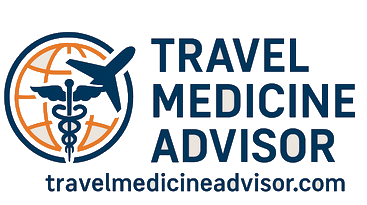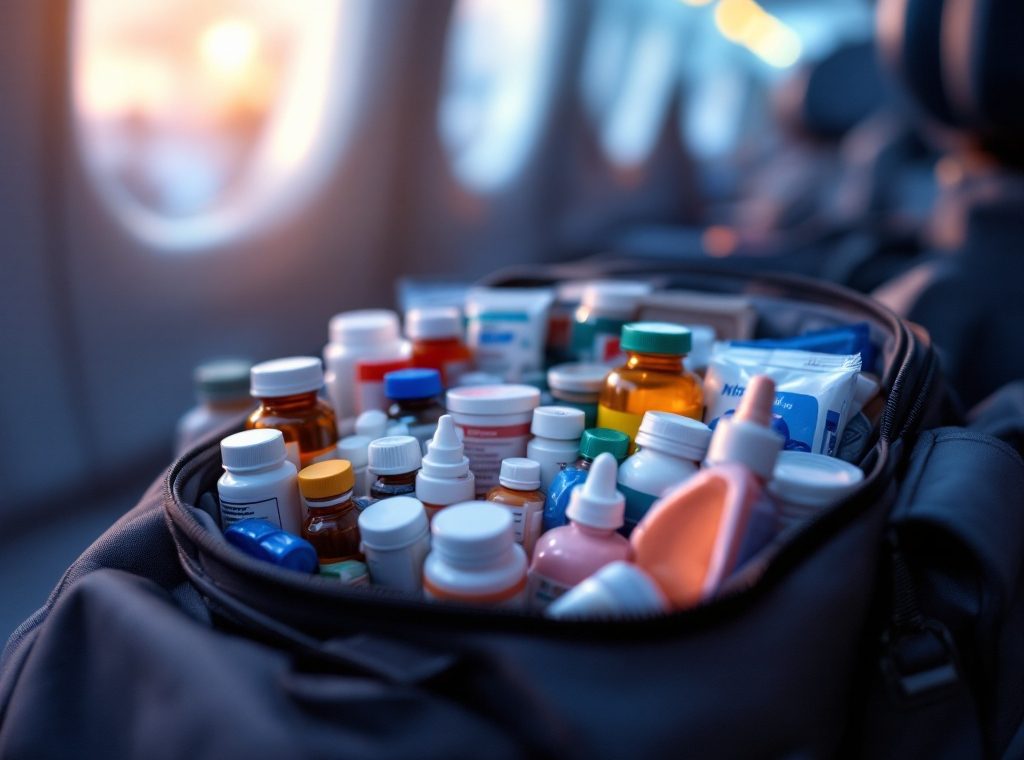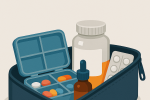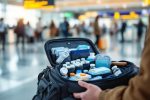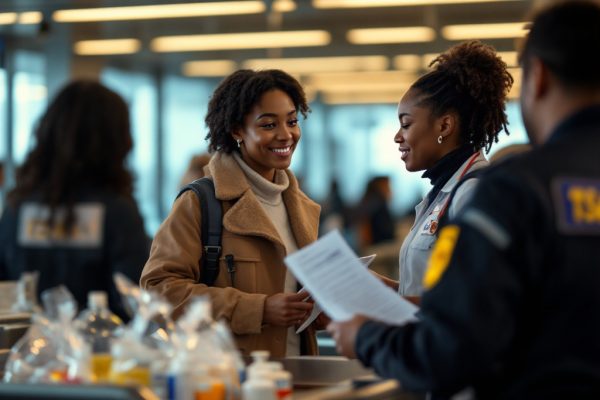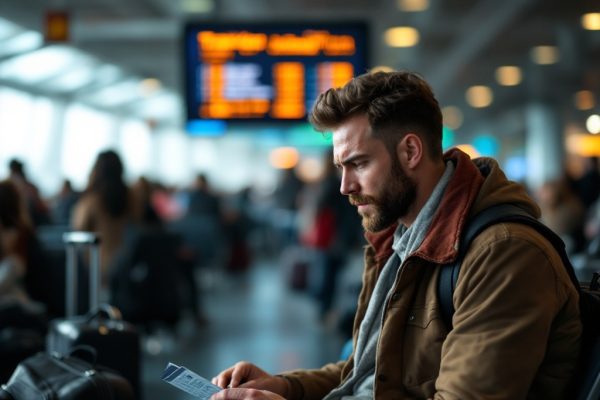Medicine Bag for Travel: What Can Be Stored in a Carry-On Baggage
Safeguard your health while traveling! Learn how to pack a carry-on medicine bag with essential prescriptions, over-the-counter remedies like pain relievers and allergy meds, and vital first-aid supplies. Discover TSA guidelines for medications, including liquid exceptions and tips for traveling with medical devices like EpiPens and CPAP machines. Ensure a healthy and stress-free trip by reading our comprehensive guide now.
Important information
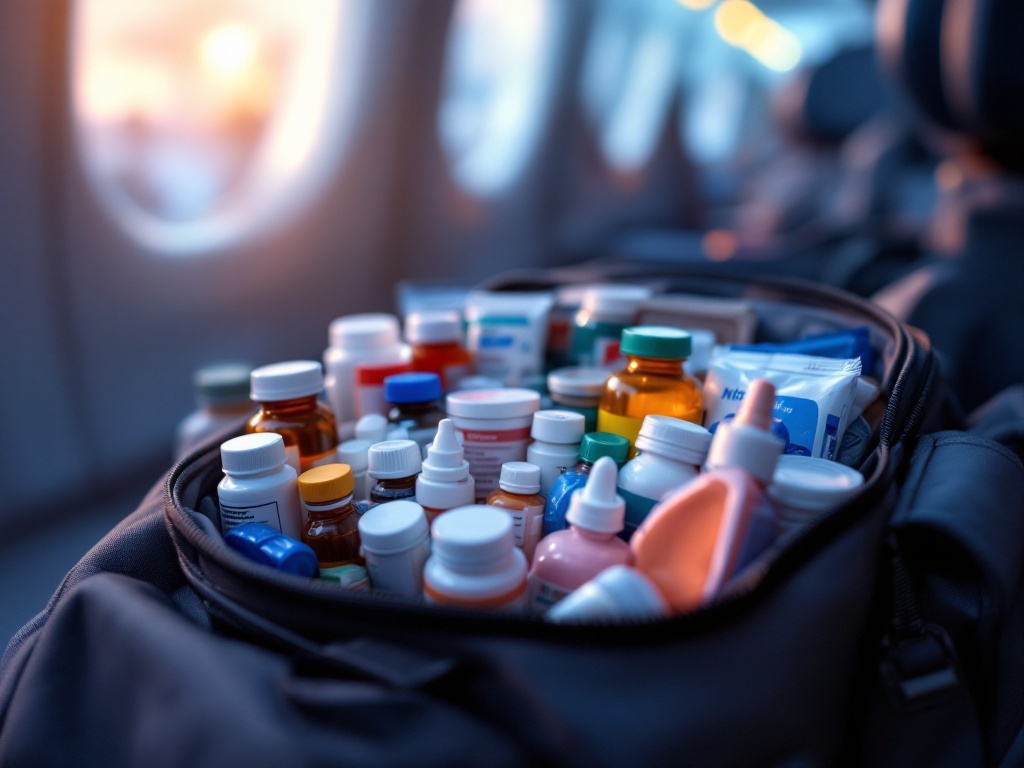
- Keep prescription medications in their original, labeled containers for security checks. A doctor’s note is helpful, especially for controlled substances.
- Essential liquid medications are allowed in carry-ons, even if they exceed 3.4 ounces, but declare them to TSA. Solid medications have no quantity limits.
- Pack vital medications (EpiPens, inhalers) in your carry-on for easy access.
- For international travel, research your destination’s rules on medications, carry prescription copies and a doctor’s note, and consider travel insurance.
- Use a cooler bag with ice packs for temperature-sensitive medications, but avoid direct contact with the ice.
Medicine Bag for Travel: What Can Be Stored in a Carry-On Baggage
A well-organized travel medicine bag is crucial for any trip. It safeguards your health essentials, especially during transit, and some bags even offer locking mechanisms for added security. Inside, store vital prescriptions in their original labeled containers to breeze through security checkpoints. A doctor’s note can also prevent any medication-related hassles.
Over-the-counter remedies
- pain relievers,
- allergy medication,
- cold medicine.
First-aid necessities
- band-aids,
- antiseptic wipes.
Finally, personalize your kit with any other health items you require.
Essential Medications to Include in Your Carry-On
Pack essential prescription medications, such as EpiPens and inhalers, in your carry-on bag for easy access during emergencies. This also prevents issues if your checked luggage is lost. Keep these medications in their original, labeled containers. It’s also recommended to carry a doctor’s note listing your prescriptions to avoid potential issues.
Prescription Medications and Their Importance
Traveling with prescription medications is straightforward. Keep them in their original containers for easy identification during security screenings. While the TSA permits pill organizers, having the original bottles can expedite the process. The original label offers crucial details about your medication and confirms the prescription belongs to you. For a smoother travel experience, consider packing both your pill organizer and the original medication bottles.
Over-the-Counter Medications for Travel
When packing for your trip, remember to include common over-the-counter medications such as pain relievers, motion sickness remedies, allergy pills, and digestive aids. Keeping these essentials in their original packaging within your carry-on will ensure easy access. However, it’s always recommended to check airline regulations for any restrictions on medications.
Life-Saving Medications: EpiPens, Inhalers, and More
You can definitely bring essential medications like EpiPens and inhalers on your flight, both in your carry-on and checked bags. These are vital for managing severe allergic reactions (anaphylaxis) and breathing difficulties, ensuring your health and safety during travel.
Understanding TSA Guidelines for Medications
Traveling with essential liquid medications exceeding 3.4 ounces is permitted. Simply declare them to a TSA officer at the security checkpoint for inspection. Solid medications can be brought in unlimited quantities in your carry-on bag. Remember to keep all medications in their original, labeled containers. While not mandatory, carrying a doctor’s note for prescription medications is recommended. However, different regulations apply to controlled substances. It’s wise to consult the TSA website for specific guidelines.
Liquid Medications: Exceptions to the 3-1-1 Rule
Essential liquid medications are allowed in your carry-on bag. They are exempt from the 3-1-1 liquids rule, which limits other liquids to 3.4-ounce containers within a quart-sized bag.
Solid Medications and Pill Organizers
You can pack solid medications in either your carry-on or checked baggage. Using a pill organizer is a convenient way to manage your medications during your trip, keeping them organized and easily accessible.
Controlled Substances: Proper Storage and TSA Regulations
Traveling with medication requires proper storage to ensure a hassle-free experience. Always keep your medications in their original, labeled containers. This practice not only complies with TSA regulations but also avoids potential complications. Loose pills can raise suspicion during security checks, whereas a clearly labeled bottle immediately identifies your prescription. The label displays crucial information, including your name, dosage, and prescribing doctor, verifying its legitimacy. This simple step can save you valuable time and prevent unnecessary delays during your travels.
Organizing Your Travel Medicine Bag
Packing a travel medicine bag effectively involves organizing your items into three categories:
- Prescription medications: Store these securely and ensure you have enough for your trip.
- Over-the-counter remedies: Pack common medications for headaches, allergies, and digestive issues.
- First-aid supplies: Include bandages, antiseptic wipes, pain relievers, and any personal medical necessities.
Use labeled containers or zip-lock bags to keep everything organized. Carry a detailed list of your medications, including dosages and other important medical information. A pill organizer can be helpful for managing daily medications. Choose a bag that offers easy access and compartments for quick retrieval of needed items.
Benefits of Using a Pill Case or Travel Pill Kit
Pill cases are essential for organizing your medications and preventing potentially harmful mix-ups, especially if you manage multiple prescriptions. For travelers, pill kits are particularly beneficial, helping you maintain correct dosages even when crossing time zones. Furthermore, these portable organizers protect your medications from damage and loss, ensuring they’re readily available whenever needed.
Features of a Secure Medication Travel Bag
Travel with peace of mind knowing your medications and toiletries are secure in this lockable travel bag. The TSA-approved 3-digit combination lock ensures your essentials stay protected throughout your journey.
Security Screening and Prescription Documentation
Separate medications from other items in your carry-on bag to expedite the screening process.
While not typically required for prescription medications in their original containers within the US, a doctor’s note is recommended.
A doctor’s note is especially recommended for international travel or when carrying controlled substances.
This note can facilitate screening and provide valuable information if necessary.
What to Expect During the TSA Screening Process
Inform TSA officers about any medications you are carrying. Liquids, gels, and aerosols in carry-on bags must be in 3.4-ounce or smaller containers and placed in a single, quart-sized, clear plastic, zip-top bag. This is known as the 3-1-1 liquids rule. Medications are exempt from the 3-1-1 liquids rule but may be subject to additional screening.
The Importance of Having a Doctor’s Note
Traveling with a doctor’s note, especially for prescription medications, can prevent issues with security and customs. This is particularly important for controlled substances. A doctor’s note will ensure smoother travel.
Special Considerations for Refrigerated Medications
Traveling with temperature-sensitive medications like insulin requires careful planning. Use an insulated cooler bag with ice packs to maintain a safe temperature. Ensure the medication doesn’t come into direct contact with the ice packs to prevent damage. These cooler bags are especially important during travel to ensure medication efficacy. Gel or ice packs are recommended, but avoid freezing the medication. Remember to check TSA regulations regarding liquids and ice packs for a smooth security check.
Handling Insulin and Temperature-Sensitive Medications
Once opened, insulin can be stored at room temperature, but it shouldn’t be used after 28 days. Unopened insulin needs to be refrigerated to maintain its potency.
Using Medication Coolers and Ice Packs
When traveling, medication coolers and ice packs are crucial for maintaining the correct temperature of sensitive medications, especially during longer trips. This ensures your medicine remains effective and safe to use.
Medical Equipment and Devices in Carry-On Bags
Traveling with essential medical devices is simple. Keep insulin pumps and blood sugar test kits in your carry-on bag for easy access. Never pack these in checked baggage. CPAP machines and oxygen concentrators are also allowed in carry-on luggage, but airline regulations vary. Contact your airline before your flight for a hassle-free experience.
Transportation of Insulin Pumps and Blood Sugar Test Kits
Traveling with diabetes supplies can be hassle-free with a little preparation. The TSA permits insulin pumps and blood glucose meters in your carry-on baggage, but you must declare them at the security checkpoint. Keep your insulin pump together with its supplies and insulin. Blood sugar test kits, including lancets and test strips, can be packed in either your carry-on or checked baggage.
Managing Portable Medical Devices: CPAP Machines, Oxygen Concentrators
Most airlines allow CPAP machines and oxygen concentrators in carry-on bags. However, it’s always best to confirm with your specific airline, as they may have particular requirements or request documentation for your device.
Tips for International Travel with Medications
Traveling with medication requires careful planning. Before your trip, research your destination’s medication regulations, as some countries have strict rules even for over-the-counter remedies. Carry copies of your prescriptions and a doctor’s note, especially for controlled substances. These documents should clearly state the medication’s name, dosage, and your medical condition. If you need a large quantity of medication, a doctor’s letter explaining the medical necessity is recommended. Travel medical insurance is also advisable to cover potential medical emergencies and lost medications. Pack essential medications in your carry-on bag to prevent loss or delay. For temperature-sensitive medications, research proper storage during travel and inform airline personnel. Locate pharmacies and medical facilities at your destination in case of emergencies or refill needs. Learning basic medical phrases in the local language can also be helpful.
Understanding Customs Processes and Regulations
Traveling internationally requires awareness of medication regulations. Each country has specific rules regarding permitted medications and quantities. Always declare all medications at customs. Carrying copies of your prescriptions and a doctor’s letter explaining medical conditions, especially for controlled substances, can simplify the process. Confirming your destination’s specific regulations is crucial. Travel insurance offers valuable protection for medical emergencies and lost medication.
Research your destination’s medication regulations. Find out which medications are permitted and in what quantities.
Prepare necessary documentation. Carry copies of your prescriptions and a doctor’s letter outlining your medical conditions, particularly if you use controlled substances.
Declare all medications at customs. Be prepared to present your documentation to customs officials.
Consider travel insurance. It can provide coverage for medical emergencies, including lost or stolen medication.
Ensuring Medication Availability Abroad
Before traveling, obtain a prescription from your physician covering your entire trip. Keep a copy with you, along with a doctor’s note explaining your medical needs, particularly for any controlled substances. Research the availability of your medication at your destination. If it’s difficult to obtain, locate international pharmacies or consider mail-order options. Pack sufficient medication in your carry-on bag to prevent interruptions to your treatment. Travel medical insurance is recommended, as it can cover medical emergencies and lost or stolen medications.
Obtain a prescription from your physician that covers your entire trip.
Keep a copy of your prescription and a doctor’s note explaining your medical needs, especially for controlled substances.
Research the availability of your medication at your destination.
If your medication is difficult to obtain, locate international pharmacies or consider mail-order options.
Pack enough medication in your carry-on bag to last for the duration of your trip.
Consider purchasing travel medical insurance to cover potential medical emergencies and lost or stolen medications.
